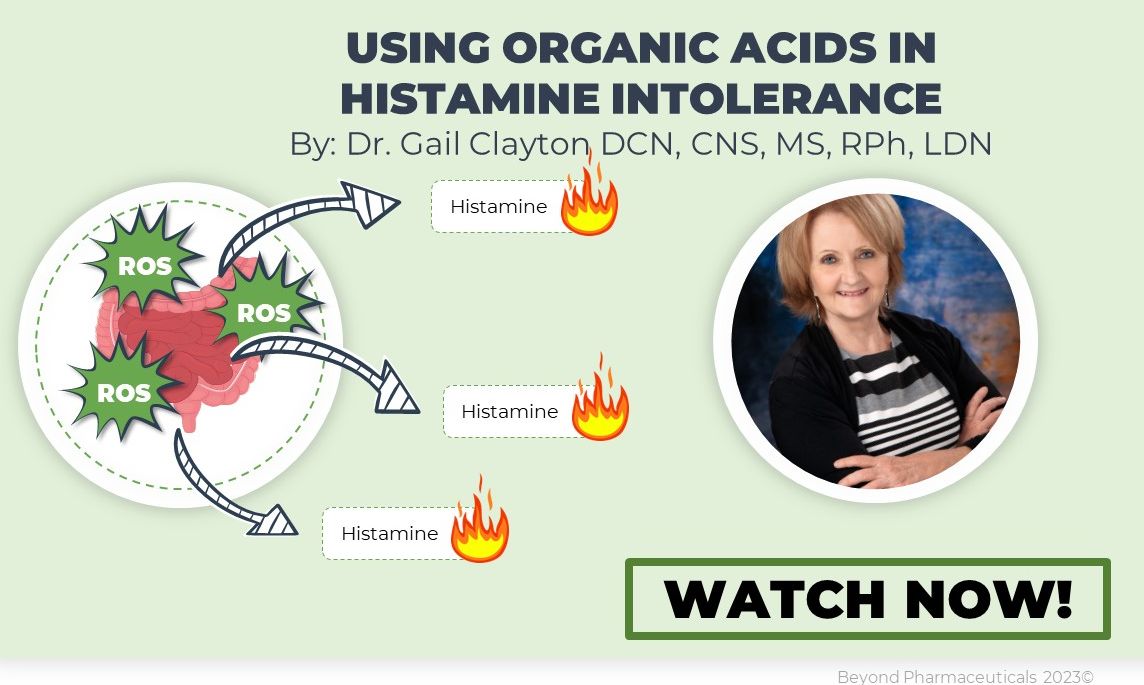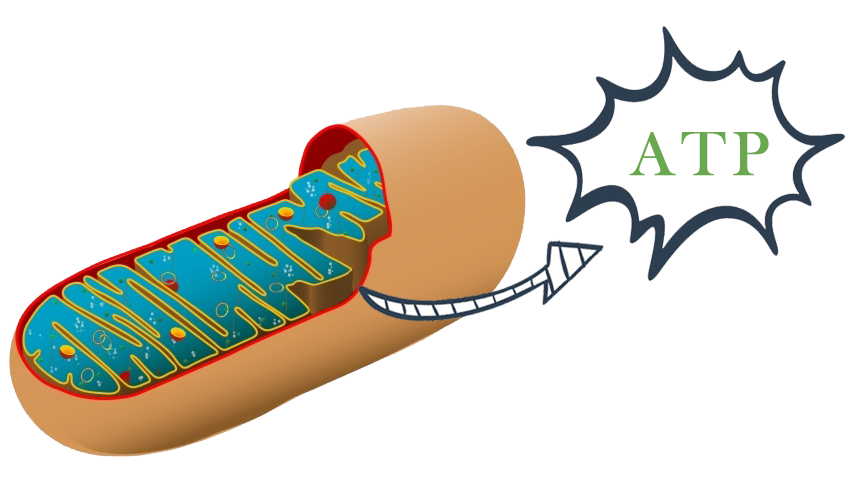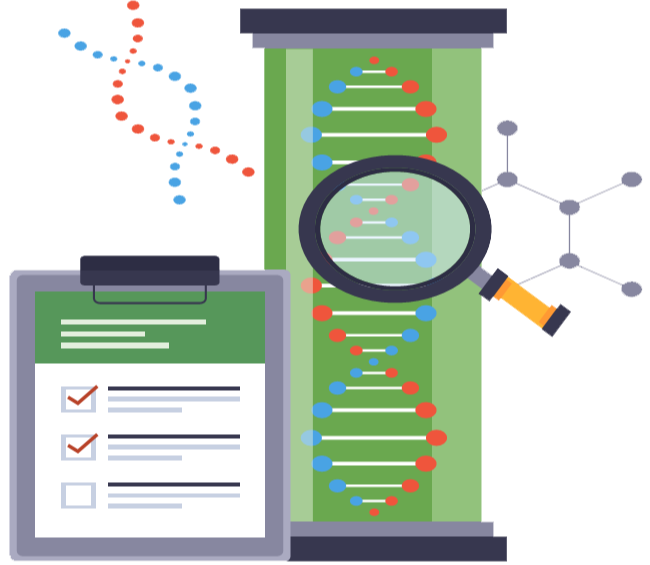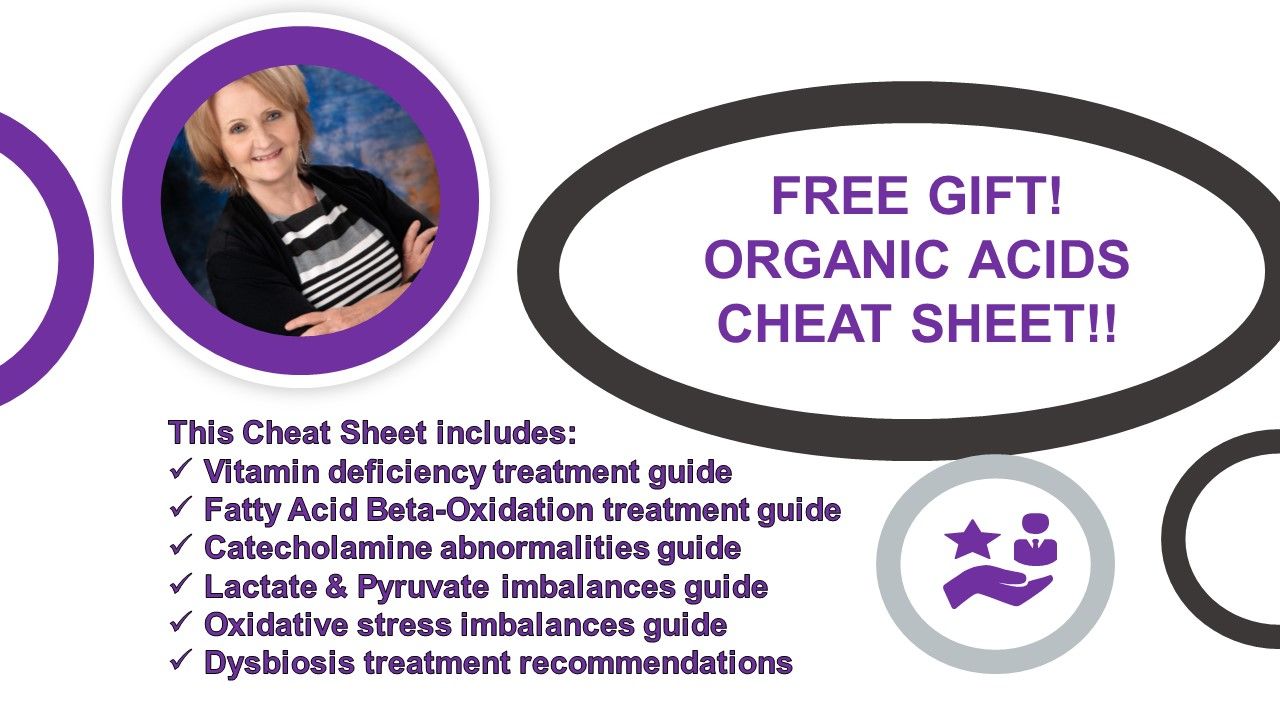
Learn How To Interpret Organic Acids Like A Pro!
About the Course:
- Content created by Dr. Gail Clayton, DCN, CNS, MS, RPh, LDN
- Markers reviewed can be applied to ANY Organic Acid Lab
- 10 Videos + 3 Bonus lectures
- Using OAT in Histamine Intolerance/Mast Cell
- Using OAT to assess Free Radicals and Antioxidants
- Using OAT in Detox & Dysbiosis
- Over 6 hours of video lectures
- Download the PDF guide to each lecture (included)
- Opportunity to purchase accompanying workbook
- 5.5 CE credits available for Certified Nutrition Specialists
- Price of course $299 for the first 3-month of your membership, then $33/month thereafter. Please read the cancellation policy on the check-out page!
- NEW! Q&A case study recordings will be added continually!

Show off your knowedge by earning a badge!
Earn a badge to place on your website indicating that you are an "Organic Acids Trained Practitioner"

Grow your practice!
Patients are frustrated because it's difficult to find a practitioner that truly understands this test and apply it to their particluar situation. Patients will seek you out for help!

Improved patient outcomes!
With Organic Acids you will learn how to identify metabolic blocks to target for a personalized plan!
USING ORGANIC ACIDS IN HISTAMINE/MAST CELL INTOLERANCE
This webinar was offered as an incredible opportunity for practitioners and patients to learn how to look at organic acid results as it relates to histamine symptoms and what markers to place your focus in improving mast cell/histamine intolerance.
Dr. Clayton dives deep into the organic acid markers involved in histamine secretion and metabolism. Knowing where to focus your attention can help you pinpoint areas to target when developing your personalized treatment plan.

WATCH FREE WEBINAR REPLAY
In 10 modules, with videos, this course teaches:

An in-depth understanding of the biochemical pathways where we can measure high flux intermediates of cellular metabolism.

How to assess patterns that you will see in your patients test results.

How to modulate imbalances of metabolism back into balance.

How to assess energy homeostasis; What causes low energy production; How energy is regulated; How to develop a plan for restoration.
Testimonials
Dr. Clayton’s students at The University of Bridgeport were thrilled by the material presented in the Organic Acids course! Here are a few of the feedback comments provided by her students:
~ I just love Gail! I made sure to get into her class this semester because she is so smart and knowledgeable. Her lectures are fun and engaging!
~ Dr. Clayton’s passion for the subject matter is infections. Her enthusiasm makes it easy to learn. I cannot overstate how critical this energy is when learning this information. She brings the content alive and I’m carried away with her excitement. It breaks open the material to be so much more compelling and fascinating than a dry, academic style. I wish I could have attended all of her lectures live. I was always breaking into a smile and laughing during her lectures as I watched the videos.
~ Dr. Clayton talks through the main points to help drive the home. Many client vignettes to illustrate points. She offers lots of good clinical pearls, advice for managing clients in our future practices, and she has a great enthusiasm for the topic!
~ The course was very well designed, well taught, and very relevant to practice. Students also learned the science behind each mechanism and pattern.
~ Dr. Clayton did a great job teaching the course and making the material digestible.
~ The clinical pearls from Dr. Clayton are always great.
~ The course was very extensive in the range of conditions discussed.
~ The clinical experience Dr. Clayton brings to the course and shares with the class is so valuable and appreciated. Few professors take the time to personalize their courses in such a way.
~ The course material was great and the instructor, Dr. Clayton does a great job of making very difficult topics easier to understand. She also provided practical applications of the material, which I believe is equally important.
Learn in Modules 7 & 8 What Regulates Energy Production in the Mitochondria!
If you have struggled in helping your patients recover from:
- Fatigue
- Mood swings
- Mast cell activation
- Out-of-control immune polarization….
Then you will not want to miss out on this learning opportunity.


Are You Asking Your Patients the Right Questions on Your Intake Form?
Download a copy of Dr. Clayton’s intake form and use any or all of the questions to formulate your own form.

- Patient’s Chief concerns
- Symptoms
- Diet & hydration history
- Digestion assessment
- Histamine assessment
- Medical & Dental history
- Rx & Supplements consuming
- Exposure history
- Toxic mold exposure questions
- Stress assessment
- Sleep assessment
DOWNLOAD a FREE copy of Dr. Clayton’s intake form here:

What Others Have To Say About This Course
Dr. Sharon Yeh
PharmD, MS, CNS
Dr. Gail's Clayton's organic acid course made this complex topic simple! I have watched many OAT lectures in the past, and this is the best training in OAT! It is full of clinical pearls and practical information that I could apply immediately to my practice. Thank you for putting together this course!
Here’s What You Get
MODULE 1 – Introduction
MODULE 2 – Vitamins
MODULE 3 – Beta oxidation of fatty acids
MODULE 4 – Neurotransmitters (HVA & VMA)
MODULE 5 – Kynurenine Pathway
MODULE 6 – Lactate & Pyruvate
MODULE 7 – Citric Acid Cycle – Energy Regulation
MODULE 8 – Mitochondria – Tricarboxylic Acids
MODULE 9 – Oxidative stress & Antioxidants
MODULE 10 – Malabsorption & Dysbiosis
BUY YOUR FIRST 3-MONTH MEMBERSHIP NOW FOR $299 THEN FOR $33/MONTH YOU CAN CONTINUE ON.....
CANCEL YOUR MEMBERSHIP AT ANY TIME!

Dr. Clayton drives home the importance of assessing polyphenol intake in her patients. Dietary polyphenols are a must for a healthy gut microbiome!
Here are a few things you will learn in reading the FREE handout on polyphenols:
- Polyphenols are poorly absorbed but the bacteria convert them to useful products for us
- We need a variety of polyphenols in our diet because each species has their own favorite polyphenol to munch on
- Polyphenols are the main food for healthy gut bacteria to grow out and diversify
- Foods high in polyphenols
- Problems that may arise in some of your patients with a phenol sensitivity and how to handle it
- Dr. Clayton’s tips on how to increase polyphenol intake
Stay In Touch Through My Newsletter
